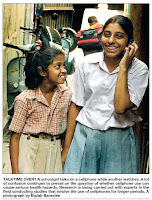Should school children be allowed to use mobile phones?
 The Karnataka government's ban on the sale of cell phones to children below the age of 16 may have invited censure from various corners, especially children, who are accusing the government of acting as a "moral brigade", but it has triggered off a debate on how the latest gadgets and electronic equipment pose a threat to a generation that cannot do without them.
The Karnataka government's ban on the sale of cell phones to children below the age of 16 may have invited censure from various corners, especially children, who are accusing the government of acting as a "moral brigade", but it has triggered off a debate on how the latest gadgets and electronic equipment pose a threat to a generation that cannot do without them. The Centre has formed a committee to evolve guidelines for bringing out legislation that will put restrictions on the usage of mobile phones and other electronic gadgets. The draft guidelines prepared by the Telecom Engineering Centre (TEC) under the Department of Telecommunications, Union ministry of communications and information technology, has proposed that cellphone use amongst children below 16 should be "discouraged", and only those cellphones should be bought which have appropriate specific absorption ratings (SAR).
The committee has also taken up the issue of radiation emissions from cellphone towers, stating that such towers should not be allowed near schools and hospitals since radiation from cellphone towers is stronger and harmful as compared to cellphones.
Various concerns about cellphone usage amongst children causing cancer, brain disorders and impacting the nervous system have been raised. "Even a threat concerning a child's health should be taken seriously," a senior health ministry official said on condition of anonymity.
Taking a balanced view of the entire debate on whether cellphones can cause serious health hazards are scientists and experts in the field, who are pleading with the Centre, as well as the public to take a balanced view. "The government's decision to ban cellphone use among children is going a little too far since you can't stop today's generation from using cellphones," said Dr V.P. Sandlas, former chief controller, R&D at DRDO and former director, electronics, in Isro. "In the past, when there were no cellphones, people used to be exposed to radiation for very brief periods. Only those working at radio or television stations were exposed to longer periods of radiation.
But today everyone is exposed to radiation for 24 hours, be it from cellphones, or towers that emit radiation," he said.
Dr Sandlas believes the problem comes not from cellphones, but cellphone towers, which emit very high radiation and are proliferating in residential areas and near schools and hospitals. "In foreign countries such towers can be found only on highways, in India there is no regulation," he said.
However, Dr Sandlas said the use of cellphones by adults near infants and children below three years should be avoided. This is because the immunity is less in infants, pregnant women, senior citizens and sick people, he explained. "Even a cellphone in standby mode emits radiation. Thus precautionary measures should be taken, like using an earphone, keeping the cellphone in a cover, etc, he said. T he ban imposed by the education department in Karnataka is applicable to colleges and institutions up to secondyear pre-university, restricting even college-going students from using cellphones. Interestingly, the community largely impacted by the ban - children and school and college authorities, feel the State's education authorities are trying to achieve "disciplinary" goals by banning the use of cell phones in schools and colleges.
"If the government is so worried about our health, why does it not enforce a blanket ban on the sale of cigarettes, alcohol to children and students and see that it is implemented," said Swati Pande, a Delhi University student. The student community believes the said ban is not implementable "in practice".
Speaking to this newspaper, Dr Shyama Chona, principal of Delhi Public School, R.K. Puram, in the national capital, said the school has imposed a ban for "disciplinary" reasons. She added that restricting the use of cellphones amongst children for "any other purpose" is the responsibility of the parents.
Ms Goldie Malhotra, principal of Modern School, Barakhamba Road in the capital, said it has been two years since the school banned cellphones. However, in an emergency, if a child needs to carry the cell phone to school, he has to leave the phone with a teacher for the period the child remains in school. She also believes that restricting the use of cellphones amongst children due to health concerns is the onus of the parents, and not the school. A lot of confusion continues to prevail on the question of whether cellphone-use can cause serious health hazards. "It is good to be cautious, but there is no proof to say that cellphones can damage the health of children," said Dr Vikas Kohli, a paediatrics surgeon at Apollo Hospitals.
By Namrata Biji Ahuja



Comments